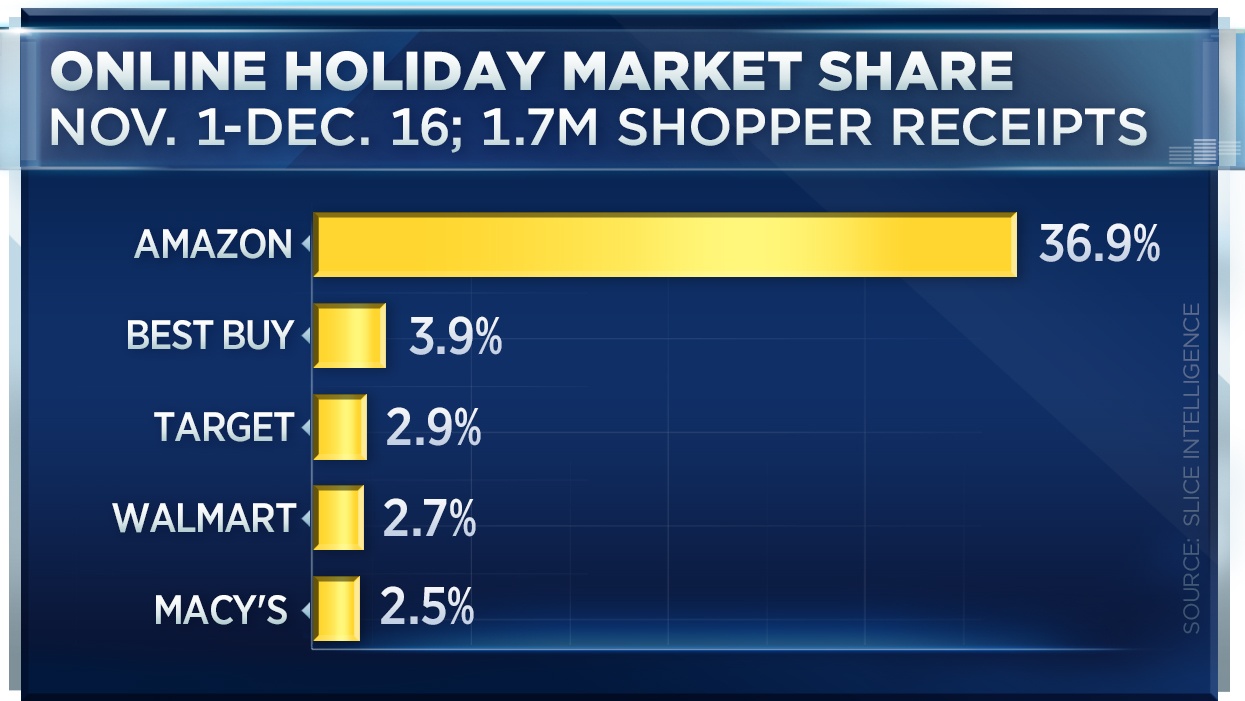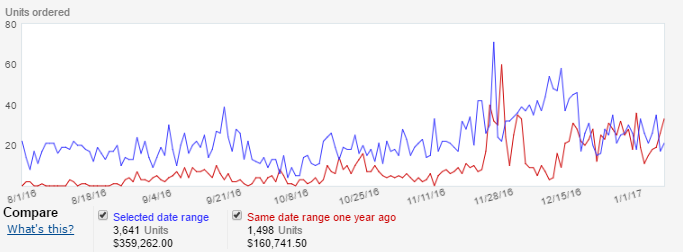Between Black Friday and a number of gift-giving holidays, the fourth quarter of any year presents big opportunities for e-commerce brands. Many stock up on inventory to ensure they don’t experience back orders during the prime shopping period, and even more spend months planning how they’ll maximize sales and profits as the year ends.
One simple mistake many brands make, though, is that they think the holiday momentum can’t be carried into January and beyond. Without a proper strategy in place, too many brands have either too much or not enough inventory, or simply don’t know what to do with a sharp increase in predictable holiday returns. So what can you do to avoid a profit dip going into a new year?
Five tested strategies that will convert lulls in sales after the holidays into a revenue-generating period that will grow your brand.
1. Make smart choices about inventory based on historical data
All the recent evidence about online sales points to Amazon taking a bigger and bigger piece of the pie every year, particularly away from more traditional retail outlets like Target and Walmart.

The best way to plan ahead is to take a look back on what your brand has done in the past. If you’ve sold 900 and 1,000 units of a particular product in the last two years, respectively, you might want to prepare for 1,100. The goal is to have enough inventory, but not so much that you’ll incur higher costs after the holiday season.
Before coming to work with us at Bobsled Marketing, one of our clients mistakenly sold out of stock before Christmas of 2015. Because they weren’t able to restock until after the new year began, they missed out on an incredible number of sales. In the graph below, you can see the sharp decrease in sales at the end of November and beginning of December, reflecting the lack of inventory.

We looked at the brand’s numbers and helped them plan ahead to maintain sufficient stock through the holidays and into the new year.

It’s not difficult to see the difference between 2016 (blue) and 2015 (red), particularly in the period between November 28 and December 15. That alone accounts for an impressive jump in the overall sales and revenue picture for the year. By using past experiences as the foundation to do some inventory optimization, brands can gain immediate value from the post-holiday season.
2. Plan for an influx of returns
Brands across the spectrum—from clothing companies to makers of kitchen appliances—see a massive influx of returned inventory after the holidays. In fact, in 2015, consumers returned $260 billion in merchandise to retailers, according to the National Retail Federation.
It’s important to keep track of the volume and the rate of returns. Out of 100 purchases, how many are returned? With these numbers in hand, you can begin to make better decisions about when to push for more sales, or what kind of inventory you might need to keep on-hand to deal with customer concerns. We truly believe that no amount of data is too much.
Liquidators offer an opportunity for brands to recoup costs from returned and used goods. Just be careful—many liquidators will put your products right back on Amazon, at a reduced price. You don’t want to compete with a liquidator to sell your own products.
Another option is collaborating with a specialist repackaging company. They’ll handle the returned stock and get it ready to head out the door again. This arrangement can help significantly increase your brand’s profitability.
3. Never stop selling
Yes, the big buying time of the year has passed. But don’t let that stop your brand from being proactive about making the most out of January and beyond. The best way to start off the new year with strong profitability is to ensure you have stock available in January and are ready to take advantage of greater visibility on Amazon due to new positive reviews left during the holiday season.
Try planning a flash sale or a big promotion that can kickstart the new year—it’s still not too late to remind consumers about your brand and present them with an excellent deal. These tactics can help you not only rid yourself of excess inventory, but also raise sales numbers in an otherwise slow period.
4. Take advantage of the holiday saving grace: gift cards
According to a recent survey, nearly 29 percent of consumers receive one or more gift cards during any given holiday season. On top of that, more gift-givers are realizing that a gift card to Amazon, nicknamed “The Everything Store,” offers their friends and loved ones the most flexibility and opportunity.
Those who do get gift cards quickly start looking for the best ways to spend their newfound cash. This can happen immediately after the holidays, but some also wait until the new year to start looking for their next buy. We’ve seen clients grow sales by pushing flash sales that target customers with gift cards in hand. There’s an added value to gift cards as well: 71 percent of them spend more than the card’s value in the end, resulting in higher revenue for you.
5. Step back, get some perspective
January might seem like a massive lull in your sales, but that’s probably just part of the bigger picture. Take a look at the annual sales charts of a few or our long-term clients in the home and kitchen category.


In both examples, we can clearly see the large post-Thanksgiving spike in sales, which lasts until just before Christmas. There is a slight dip in sales as the new year approaches, but a number of the spikes are on par with sales levels for the rest of the year. It doesn’t take long for this brand to get back into the swing of things, and because they have the necessary inventory, they’re ready to go. Just two more examples to prove that January doesn’t have to represent a lull in sales.
Want to start taking advantage of these methods to improve your post-holiday sales numbers? Check out “The Amazon Expansion Plan”, our comprehensive resource for marketing managers and owners of consumer brands who want to do more on Amazon.
*New Version Launched June 27, 2018
Selling on Amazon is an incredible opportunity—yes, even in the post-holiday season. Take advantage of every season and every swing in sales to improve your numbers and better position your brand for growth.
.png)
